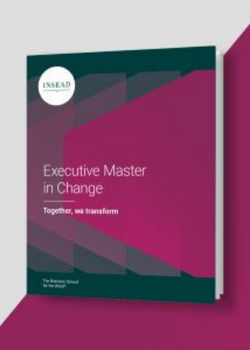We asked Nicky Sparshott, CEO of Unilever Australia & New Zealand, to share her experience of INSEAD’s Executive Master in Change (EMC) programme. Read on to find out what drew her to the EMC, how it helped her lead her organisation through the pandemic, and the key takeaways she gained. Nicky also talks about ways the programme continues to impact her professional life, and how its learnings can help with a purpose-led approach to leadership.

What first sparked your interest in INSEAD’s EMC programme?
I was drawn to the EMC’s focus on helping leaders develop capabilities to tackle complex problems and navigate through change. That’s clearly relevant to the times we’re living in given the volatility caused by the aftermath of the pandemic and ongoing global economic and political turbulence.
There was also a more personal reason. I’m a passionate advocate for purpose-led leadership, especially when it comes to helping businesses drive sustainable agendas that can positively impact people and the planet. But by its very nature, that kind of leadership can ruffle feathers.
So I wanted to develop my ability to use my voice to affect change, especially in areas that require the courage of your convictions to overcome adversity.
A big part of the EMC’s content is about self-development and psychological approaches to management, so I felt it would fit the bill.
And what impact did the programme have on your professional life?
A few months into the EMC, I began my role as Unilever’s CEO for Australia and New Zealand. On my first day, Sydney – where I’m based – went into lockdown. So straightaway, I was plunged into unprecedented volatility, and my role was to lead the company through it. Truly a ‘baptism by virus,’ as I call it!
The timing turned out to be a blessing. I felt as if everything I was learning on the EMC came at just the right moment.
My job became the real-life counterpart to my studies, where I could apply the theoretical and psychodynamic concepts we were learning and see the practical benefits immediately.
What were the key takeaways?
One insight that really stood out was the importance of being able to sit with ambiguity for longer.
Past leadership development training had always stressed the need to be action-oriented – to strike while the iron is hot, so you never lose momentum when pursuing change. But in complex and turbulent environments, it’s not always possible to get all the facts that you need to act.
The EMC helped me understand how in such situations, it can be more productive to hold the fire and get more comfortable with all the ambiguities at play before acting. That way, you’ll be able make to better decisions, even when faced with pressing problems that lack clear resolutions.
Another excellent takeaway was the importance of listening twice as much as you speak. That approach also proved vital. While my organisation had plenty of pandemic-related challenges, there were also great solutions being put forward – often from leaders outside the C-suite who were closer to the operational realities. I just needed to become better at hearing them.
A third profound learning involved developing a better appreciation of people’s defence mechanisms, particularly in times of fear. Once leaders have the tools to diagnose these situations more intuitively and understand why someone is responding in a certain way, it can be easier to manage things for mutually beneficial outcomes.
I’d like to think that these three things taken together are helping me to be a better, humbler leader.

Were there any especially inspirational moments or breakthroughs?
I found the discussions around the power of vulnerability pretty transformative. Our default definitions of how a leader should behave can sometimes draw on outdated stereotypes and clichés. Often, the view is that you need to act in a way that is quite authoritative and all-knowing, arguably even a little aggressive.
I don’t know how many times people have said to me, “Cut your hair shorter, don’t wear high heels, chuck on a pants suit, don’t be quite so enthusiastic about everything and then maybe you’ll be taken more seriously as a leader”.
And actually, what a load of rubbish!
In my experience, there’s a real opportunity to drive high performance just by being vulnerable with your people.
You acknowledge that everyone’s dealing with issues – we’re all in the same boat. And out of that shared awareness, much richer communications about goals and outcomes can take place.
How about after you completed the programme? Has the EMC impacted your professional life in other ways?
Yes, it’s helped me build my platform as a leader. A year after I finished at INSEAD I did a TEDx talk entitled ‘Love – the new corporate currency supercharging results’ that built on the thesis I completed during the EMC.
In it, I interviewed some of Australia’s leading CEOs about how they unlocked their own leadership capabilities to deliver remarkable results during the pandemic and other crises.
My core point was that, with decades of experience as a successful leader, I’ve seen how powerful love and compassion can be to stimulate innovation and transformation in the teams I’ve led. I aimed to answer the question, how do you begin to fear less and love more at work?
I looked at the critical role that compassion plays in both containing anxiety and building psychological safety, enabling team members to unleash capability beyond what was thought possible.

Earlier, you mentioned wanting to hone your ability to operate as a purpose-led leader. Was the EMC helpful in that regard? Can learnings from the programme help leaders better address issues such as climate change?
I think what you develop on the EMC is the ability to deal with dynamic problems that don’t have clear solutions, or that require multi-stakeholder engagement to solve. Developing a response to climate change could be seen as just that kind of issue.
So yes, learnings from the programme can certainly help with a purpose-led approach. The EMC’s content and learning methodology enables leaders to think about the change process in a holistic way, starting with how they themselves operate. It goes on to look at how to create change effectively and embed it into the organisation.
Leading on an issue like climate action might involve embracing more humanity; more distributed, people-centred leadership; and more service-oriented approaches.
Of course, organisations want profitable growth, but we also want to have a regenerative impact on the planet, and to contribute to a fairer and more socially inclusive world in a material way. We need to know how to do all those things holistically.
Any advice for potential EMC participants who may be considering signing up?
I’d say go for it! There is something quite unique about the EMC. For me, it has something to do with the emphasis it puts on being curious, on seeking an outside-in perspective, on pressure-testing your own beliefs, and on creating a safe and supportive space to do just that.
Then there’s the fact it attracts some incredible teachers and a highly multicultural, diverse range of students who bring a wide range of perspectives to class.
Also important to me is INSEAD’s commitment to being the world’s best business school, but in a purposeful way that also serves the world. It’s an extraordinary combination.
Nicky Sparshott attended the Asia section of the INSEAD Executive Master in Change (EMC), an 18-month part-time programme for senior executives based on the INSEAD Asia campus in Singapore.
By integrating business education with a range of psychological disciplines, the EMC prepares participants to assume roles in leading organisations, drive individual and organisational development, and successfully execute change management. Download the programme brochure to find out more.







